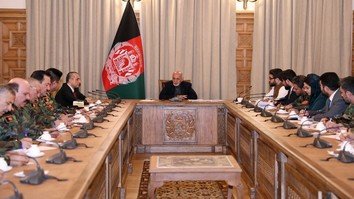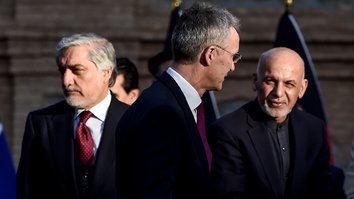KABUL -- A power-sharing agreement signed Sunday (May 17) by President Ashraf Ghani and his political rival Abdullah Abdullah ends a months-long feud and renews hope for a peace deal with the Taliban.
The agreement, which sees Abdullah heading peace talks with the Taliban, comes as Afghanistan battles surging militant violence that saw dozens killed in brutal attacks last week.
The United States and NATO welcomed the agreement, with both calling for a renewed push for Afghan-led peace talks.
"Dr. Abdullah will lead the National Reconciliation High Council and members of his team will be included in the cabinet," Ghani spokesman Sediq Sediqqi said on Twitter.
The agreement ensures that Abdullah's group will get 50% of cabinet positions and other provincial governors' posts, Abdullah spokesman Fraidoon Khazon told AFP.
Ghani hailed a "historic day" for Afghanistan, noting that the agreement was reached without any international mediation.
"We will share the burden, and our shoulders, God willing, will be lighter," he said, addressing Abdullah at the signing ceremony broadcast on a state-run television channel.
"In the days ahead, we hope that with unity and co-operation, we will be able to first pave the ground for a ceasefire and then lasting peace," Ghani said.
The deal commits the signatories to forming a "more inclusive, accountable and competent administration", said Abdullah.
"It's meant to ensure a path to peace, improve governance, protect rights, respect laws and values," he said on Twitter after signing the deal.
The agreement commits Ghani to making Abdul Rashid Dostum, his former vice president turned ally of Abdullah, a marshal of the Afghan National Defence and Security Forces (ANDSF).
Dostum is accused of ordering the torture and rape of a political rival in 2016. He denies the allegations.
Allies, Afghans welcome political settlement
The United States, which has been leading negotiations with the Taliban on behalf of the Afghan government, expressed hope that Afghan-led peace talks could now move forward.
US Secretary of State Mike Pompeo told Ghani and Abdullah "that the priority for the United States remains a political settlement to end the conflict", his spokeswoman Morgan Ortagus said in a statement.
NATO, which maintains a training mission in Afghanistan, issued a similar message.
"In the midst of the COVID-19 pandemic and continued Taliban violence against their fellow Afghans, it is more important than ever that all Afghan leaders unite and work towards enduring peace in Afghanistan," NATO chief Jens Stoltenberg said in a statement.
"We call on the Taliban to live up to their commitments, reduce violence now, take part in intra-Afghan negotiations, and make real compromises for lasting peace and the benefit of all Afghans," he said.
Kabul residents expressed a mixture of hope and scepticism over the deal.
"If they really want to work for the country ... they have to bring genuine peace to the country -- that is the only thing the majority of Afghans want," Rashed Hashemi, an employee at a private company, told AFP.
Pictures released by the presidential palace showed Abdullah and Ghani sitting side by side for the signing ceremony.
Abdullah had previously served as Afghanistan's chief executive under a power-sharing arrangement reached after the disputed presidential election in 2014. He lost that post after Ghani won the election last September.

![President Ashraf Ghani (right) and Abdullah Abdullah signed a power-sharing deal on May 17 that puts Abdullah at the head of the National Reconciliation High Commission to lead future peace talks with the Taliban. [Afghan Presidential Palace (ARG)/Twitter]](/cnmi_st/images/2020/05/18/24096-ghani-abdullah-585_329.jpg)







Before the presidential elections, a poll was launched on this beautiful news website, but I do not remember the exact date of the poll. The poll asked, “How will be the next government between Abdullah and Ghani?” Believe me; I gave the same comment of 50-50. I said that it would be the national unity government and it would continue but with a different name. Also I said that there was very little chance that Abdullah would become president, and Ghani would be the chief executive, because the position of Chief executive for Ghani would not be acceptable at all and he would not accept it, and so it happened. The donkey is the same, but only its packsaddle has changed. Everything is the same as before. No difference has come and will not come either. They just removed the word national unity and changed it.
Reply6 Comment
This agreement will probably have 5 percent effect on security, or probably it may not have the same 5 percent effect as well, because everything is determined by interests. However, neither Abdullah, nor Ghani, or Taliban are winners of this war. This war has brought nothing except destruction and misery to the whole Afghan nation, as well as to all the ethnic groups. It destroyed all except the United States, which somehow pulled itself out of the quagmire. The situation will get worse; it will not be better. There is a saying, “Dry-nurse is kinder than mother.” Khalilzad, who is now suing on behalf of Taliban, says Taliban have not carried out recent attacks. He is also pleading for Taliban. Until yesterday, Taliban were global terrorists, and American slogan from Bush to Obama’s administration was that there would not be deal and political agreement with the terrorists. Bush has said, “we will implement justice on them or bring them to the justice”. What happened to the superpower??!! Why did you become Taliban defenders today and Taliban become your defenders? Khalilzad was used by America as a bead; he was tossed up and was tossed up well, and America hit the target well, but the fact is that our politicians care about themselves and our nation is sleeping, living in illiteracy and negligence. There is no doubt that the America’s arrow will hit the target.
Reply6 Comment
First, Abdullah did not achieve his goal and he also prevented Ashraf Ghani from achieving his goal. Second, Taliban will not let these two achieve their goals. Third, these two will not let Taliban achieve their goals. Fourth, it is not clear in Afghanistan who is working for whom. It will be clear then that what kind of bead Khalilzad has been in the country.
Reply6 Comment
16. People’s concern about future of the country decreased after the agreement was signed. 17. Although some people say that achieving peace approached with singing this agreement, but I believe there is still long and bumpy road towards achieving peace, because clear vision of the government has not been determined yet. 18. An anti-Pakistan triangle (Ghani, Abdullah and Saleh) was shaped. 19. Both teams restarted to divide the positions from the beginning. Everything became disorganized because power was divided. 20. Abdullah inflicted great blow to Mr. Saleh and Ata Mohammad by joining the government, because the above two persons considered themselves as the representatives of Tajiks in the government.
Reply6 Comment
In regard to the political deal between the two election teams, I would like to point out the following few matters: 1. First, the political deal is a hard blow on the semi-baked democracy and people’s determination, because the constitution was disregarded, and people lost their trust on the elections and polls. 2. This is the third time that Abdullah Abdullah has legitimized his election rival and allowed him to the Presidential Palace with his own signature (first time with Karzai and second and third times with Ghani); this matter is questionable. 3. The deal has mostly taken place between the two persons rather than between the two teams, most of the members of which are upset about the deal. 4. This deal put an end to the election problems, but not to the political impasse of the country. 5. This deal does not have executive guarantee or authority. 6. The text of the agreement mentioned about the observers, but it did not say what measures will be taken if they die. 7. Signing of the agreement showed that negotiation can prevent crisis. 8. The agreement showed that Afghanistan can no longer proceed with totalitarian government and dictatorship. 9. It proved that democracy is still not useful; instead, we should use traditional approaches. 10. Abdullah Abdullah chose the third option out of (retreat, creating crisis and sharing power). 11. People understood that no party abode by their promises, because neither Ashraf Ghani defended the law nor Abdullah Abdullah defend
Reply6 Comment
Signing of the agreement was apparently a good thing for appeasing the existing political turmoil, but I wish the elections had not held and the two hundred million dollars had not been spent (wasted). Our people went to the polls despite severe security challenges, but their votes were ignored and disregarded. Why? It would have been better if they had compromised from the beginning, because it is clear to everyone that their goal is to reach to power. Anyway, I take this agreement as a good omen. I hope it would not have been signed out of compulsion and external pressure, and that it will eventually lead to the political, economic and educational development of Afghanistan.
Reply6 Comment